-
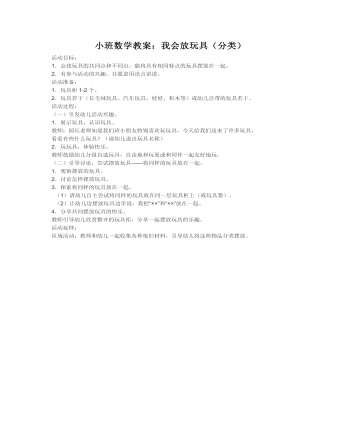
小班数学教案:我会放玩具(分类)
2.有参与活动的兴趣,并愿意用语言讲述。 活动准备: 1.玩具柜1-2个。 2.玩具若干(长毛绒玩具、汽车玩具、娃娃、积木等)或幼儿自带的玩具若干。 活动过程: (一)引发幼儿活动兴趣。 1.展示玩具,认识玩具。 教师:园长老师知道我们班小朋友特别喜欢玩玩具,今天给我们送来了许多玩具, 看看有些什么玩具?(请幼儿说出玩具名称) 2.玩玩具,体验快乐。 教师鼓励幼儿分组自选玩具,自由地和玩耍或和同伴一起友好地玩。
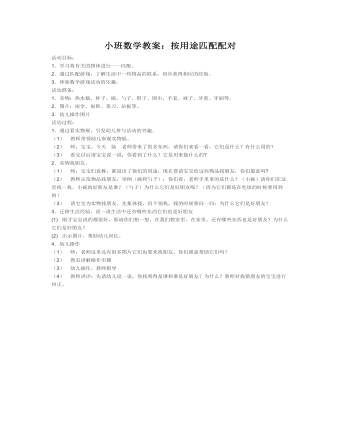
小班数学教案:按用途匹配配对
2.通过匹配游戏,了解生活中一些物品的联系,初步获得相应的经验。 3.体验数学游戏活动的乐趣。 活动准备: 1.实物:热水瓶、杯子、碗、勺子、鞋子、围巾、手套、袜子、牙膏、牙刷等。 2.图片:雨伞、雨鞋、菜刀、砧板等。 3.幼儿操作图片 活动过程: 1.通过看实物展,引发幼儿参与活动的兴趣。 (1) 教师带领幼儿参观实物展。 (2) 师:宝宝,今天 陆 老师带来了很多东西,请你们来看一看,它们是什么?有什么用的? (3) 看完以后请宝宝说一说:你看到了什么?它是用来做什么的? 2.实物找朋友。 (1) 师:宝宝们真棒,都说出了他们的用途,现在要请宝宝给这些物品找朋友,你们愿意吗?
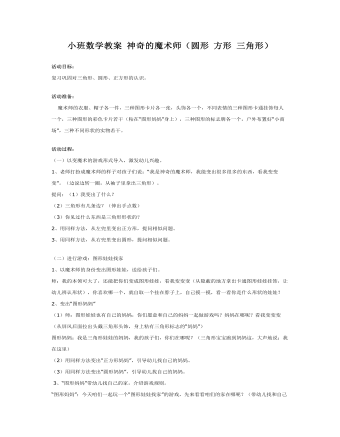
小班数学教案 神奇的魔术师
活动准备: 魔术师的衣服、帽子各一件,三种图形卡片各一张,头饰各一个,不同表情的三种图形卡通挂饰每人一个,三种图形的彩色卡片若干(粘在“图形妈妈”身上),三种图形的标志牌各一个,户外布置好“小商场”,三种不同形状的实物若干。 活动过程:(一)以变魔术的游戏形式导入,激发幼儿兴趣。 1、老师打扮成魔术师的样子对孩子们说:“我是神奇的魔术师,我能变出很多很多的东西,看我变变变”。(边说边转一圈,从袖子里拿出三角形)。 提问:(1)我变出了什么? (2)三角形有几条边?(伸出手点数) (3)你见过什么东西是三角形形状的? 2、用同样方法,从左兜里变出正方形,提问相似问题。 3、用同样方法,从右兜里变出圆形,提问相似问题。 (二)进行游戏:图形娃娃找家 1、以魔术师的身份变出图形娃娃,送给孩子们。 师:我的本领可大了,还能把你们变成图形娃娃,看我变变变(从隐蔽的地方拿出卡通图形娃娃挂饰,让幼儿辨认形状),你喜欢哪一个,就自取一个挂在脖子上,自己摸一摸,看一看你是什么形状的娃娃?
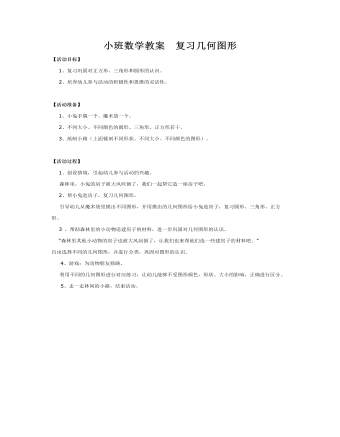
小班数学教案 复习几何图形
【活动准备】 1、小兔手偶一个、魔术袋一个。 2、不同大小、不同颜色的圆形、三角形、正方形若干。 3、纸制小路(上面镂刻不同形状、不同大小、不同颜色的图形)。 【活动过程】 1、创设情境,引起幼儿参与活动的兴趣。 森林里,小兔的房子被大风吹倒了,我们一起帮它造一座房子吧。 2、帮小兔造房子,复习几何图形。 引导幼儿从魔术袋里摸出不同图形,并用摸出的几何图形给小兔造房子,复习圆形、三角形、正方形。
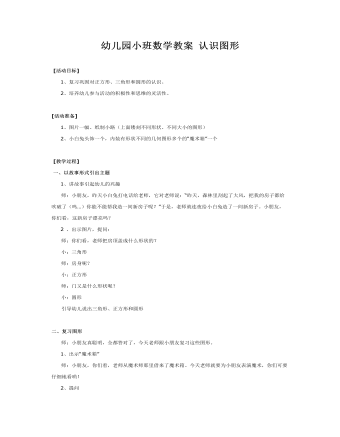
幼儿园小班数学教案 认识图形
[活动准备] 1、图片一幅、纸制小路(上面镂刻不同形状、不同大小的图形) 2、小白兔头饰一个,内装有形状不同的几何图形多个的“魔术箱”一个 [教学过程] 一、以故事形式引出主题 1、讲故事引起幼儿的兴趣 师:小朋友,昨天小白兔打电话给老师,它对老师说:“昨天,森林里刮起了大风,把我的房子都给吹破了(呜…)你能不能帮我造一间新房子呢?”于是,老师就连夜给小白兔造了一间新房子。小朋友,你们看,这新房子漂亮吗? 2 、出示图片,提问: 师:你们看,老师把房顶盖成什么形状的? 小:三角形 师:房身呢? 小:正方形 师:门又是什么形状呢? 小:圆形 引导幼儿说出三角形、正方形和圆形
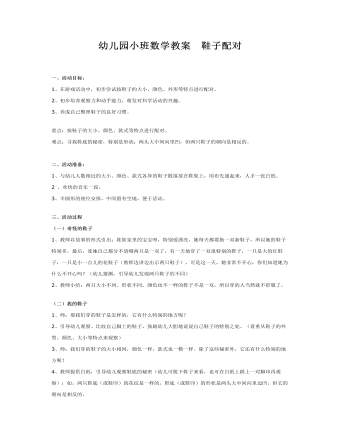
幼儿园小班数学教案 鞋子配对
2、初步培养观察力和动手能力,萌发对科学活动的兴趣。 3、养成自己整理鞋子的良好习惯。 重点:按鞋子的大小、颜色、款式等特点进行配对。 难点:寻找鞋底的秘密,特别是形状:两头大中间向里凹,但两只鞋子的朝向是相反的。 二、活动准备: 1、与幼儿人数相近的大小、颜色、款式各异的鞋子散落放在鞋架上,用布先遮起来,人手一张白纸。 2 、欢快的音乐一段。 3、半圆形的座位安排,中间留有空地,便于活动。 三、活动过程 (一)奇怪的鞋子 1、教师以故事的形式引出:娃娃家里的宝宝呀,特别爱漂亮,她每天都要换一双新鞋子,所以她的鞋子特别多,最后,连她自己都分不清哪两只是一双了,有一天他穿了一双很特别的鞋子,一只是大的红鞋子,一只是小一点儿的花鞋子(教师边讲边出示两只鞋子),可是这一天,她非常不开心,你们知道她为什么不开心吗?(幼儿猜测,引导幼儿发现两只鞋子的不同) 2、教师小结:两只大小不同、形状不同、颜色也不一样的鞋子不是一双,所以穿的人当然就不舒服了。
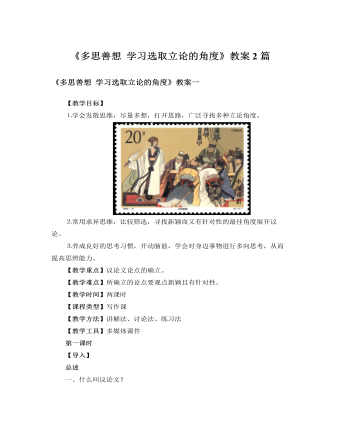
人教版高中语文必修3《多思善想 学习选取立论的角度》教案2篇
1、变换角度,多向思维(多向思维要求思维能针对问题,从不同角度,用多种方法去思考问题。对于作文而言,就是要使学生学会对同一问题,同一素材,同一题目,同一体裁的不同进行区分。)请学生从这则材料中分析出几个角度,准备课堂交流:19世纪法国著名科幻小说家儒勒?凡尔纳,一生写了104部科幻小说。当初他的第一部科幻小说《气球上的星期五》接连被15家出版社退回。他当时既痛苦又气愤,打算将稿子付之一炬。他妻子夺过书稿,给他以鼓励。于是他尝试着走进第16家出版社。经理赫哲尔阅读后,当即表示同意出版,还与儒勒?凡尔纳签订了为期20年的写作出版合同。这则材料叙述时没有一定的中心,属于开发性材料,分析材料中人物、人物关系、故事的不同侧面,可以从不同角度得出结论:
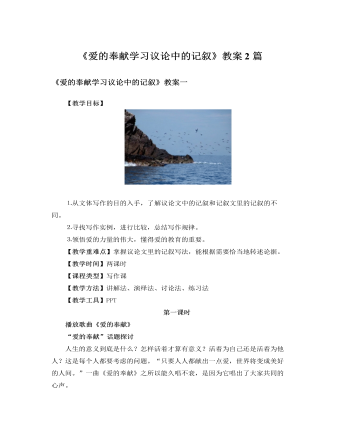
人教版高中语文必修3《爱的奉献学习议论中的记叙》教案2篇
方法点拨教师:有的同学叙述事实论据时,不突出重点和精华,不注意取舍,水分太多,有许多的叙述描写,有时还有详细的故事情节,文章几乎成了记叙文,使文章的论点无法得到充分的证明,这是写议论文的大忌。那么:议论文中的记叙有哪些特点?同学各抒己见。投影显示:1.议论中的记叙不是单纯的写人记事,记叙文字是为议论服务的,其目的是为作者所阐明的道理提供事实依据。所以,在记叙时要求简洁、概括,舍弃其中的细节,仅仅交代清楚事件或者人物的概貌即可,一般不在各种描写手段上下功夫,只要把能证明观点的那个部分、侧面交代清楚就行了。2.议论文中的记叙性文字不得超过总字数的1/3,否则视为文体不当。能力提升一、教师:了解了议论文中的记叙的特点,接下来我们看看今天的话题:“爱的奉献”,你想从哪个角度立论?有哪些素材?
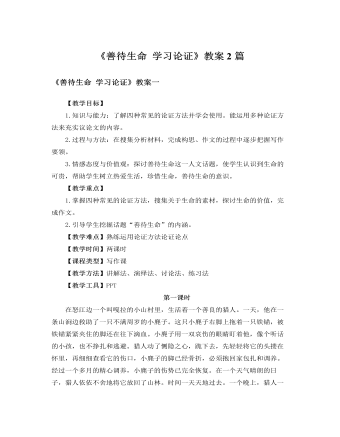
人教版高中语文必修3《善待生命 学习论证》教案2篇
论证方法之引证法如何用好引证法:1.所引用的名言警句等针对性要强。每句名言都产生于特定的背景,都应用于特定的交际目的,即使谈同一个问题,也有不少名言可供选取。2.要简洁,不宜过多。议论是在发表自己的见解而不是在介绍他人的见解。引用他人的话,目的是为了让读者更加信服自己的话。3.要注意直接引用和间接引用的区别。直接引用务求文字、甚至标点均准确无误;间接引用只须述其大意,但要注意人称的转换。论证方法之喻证法喻证法是用设喻来论证论点的方法。在议论文中,设喻可以使论点更易懂、更风趣、更容易获得读者的认同。喻证法能化抽象为具体、化艰深为浅显、化枯燥为生动。论证方法之喻证法如何用好喻证法:1.以小见大,就近取譬。要精选生活中细小的、人们熟悉的事物做为设喻的喻体。2.喻体不求形似,只求神似。做为喻证的喻体与做为比喻的喻体不同。比喻的喻体是为了强调特征,描绘事物,侧重形似,以形比形;而喻证的喻体是为了阐发观点,以正视听,力求神似,以义取形。
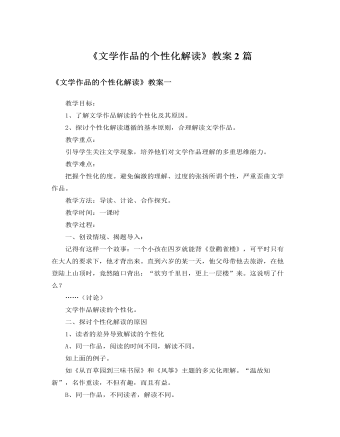
人教版高中语文必修3《文学作品的个性化解读》教案2篇
教学目标:1、了解文学作品解读的个性化及其原因。2、探讨个性化解读遵循的基本原则,合理解读文学作品。教学重点:引导学生关注文学现象,培养他们对文学作品理解的多重思维能力。教学难点:把握个性化的度。避免偏激的理解、过度的张扬所谓个性,严重歪曲文学作品。教学方法:导读、计论、合作探究。教学时间:一课时教学过程:一、创设情境、揭题导入:记得有这样一个故事:一个小孩在四岁就能背《登鹳雀楼》,可平时只有在大人的要求下,他才背出来。直到六岁的某一天,他父母带他去旅游,在他登陆上山顶时,竟然随口背出:“欲穷千里目,更上一层楼”来。这说明了什么?……(讨论)文学作品解读的个性化。二、探讨个性化解读的原因1、读者的差异导致解读的个性化A、同一作品,阅读的时间不同,解读不同。如上面的例子。如《从百草园到三味书屋》和《风筝》主题的多元化理解。“温故知新”,名作重读,不但有趣,而且有益。B、同一作品,不同读者,解读不同。
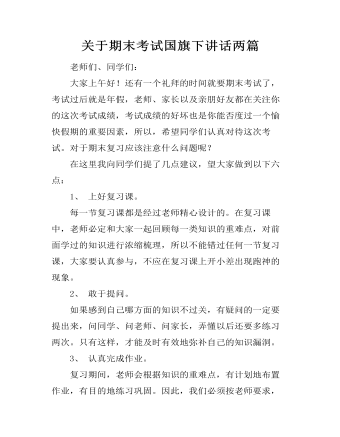
关于期末考试国旗下讲话两篇
老师们、同学们:大家上午好!还有一个礼拜的时间就要期末考试了,考试过后就是年假,老师、家长以及亲朋好友都在关注你的这次考试成绩,考试成绩的好坏也是你能否度过一个愉快假期的重要因素,所以,希望同学们认真对待这次考试。对于期末复习应该注意什么问题呢?在这里我向同学们提了几点建议,望大家做到以下六点:1、 上好复习课。每一节复习课都是经过老师精心设计的。在复习课中,老师必定和大家一起回顾每一类知识的重难点,对前面学过的知识进行浓缩梳理,所以不能错过任何一节复习课,大家要认真参与,不应在复习课上开小差出现跑神的现象。2、 敢于提问。如果感到自己哪方面的知识不过关,有疑问的一定要提出来,问同学、问老师、问家长,弄懂以后还要多练习两次。只有这样,才能及时有效地弥补自己的知识漏洞。3、 认真完成作业。复习期间,老师会根据知识的重难点,有计划地布置作业,有目的地练习巩固。因此,我们必须按老师要求,认认真真地做好作业,只有这样复习才能达到事半功倍的效果。4、 自我复习。
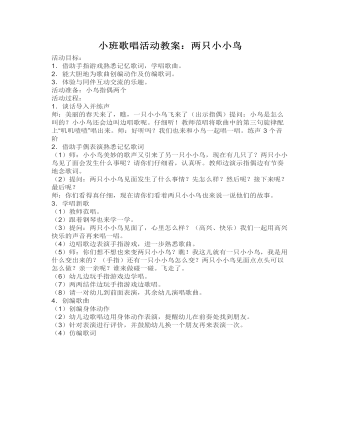
小班歌唱活动教案:两只小小鸟
2.能大胆地为歌曲创编动作及仿编歌词。 3.体验与同伴互动交流的乐趣。 活动准备:小鸟指偶两个 活动过程: 1.谈话导入并练声 师:美丽的春天来了,瞧,一只小小鸟飞来了(出示指偶)提问:小鸟是怎么叫的?小小鸟还会边叫边唱歌呢。仔细听!教师范唱将歌曲中的第三句旋律配上“叽叽喳喳”唱出来。师:好听吗?我们也来和小鸟一起唱一唱。练声3个音阶

新人教版高中英语必修3Unit 2 Morals and Virtues-Discovering Useful Structure教学设计
1. 表示时间。Hearing these stories, I’m skeptical about the place. = When I heard these stories. . . 2. 表示原因。Not knowing his address, I can’t send this book to him. = Because/Since/As I don’t know his address. . . 3. 表示结果。His father died, leaving him a lot of money. =. . . and left him a lot of money4. 表示条件。Going straight down the road, you will find the department store. = If you go straight down the road. . . 5. 表示让步。Being tired, they went on working. =Although they were tired. . . 6. 表示行为方式、伴随情况或补充说明。He lay on the grass, staring at the sky for a long time. =. . . and stared at the sky for a long time注意:非谓语动词作状语时, 如所提供的动词不能和句子中的主语保持一致, 动词-ing形式必须有自己的逻辑主语, 通常由名词或代词来担任, 这就是独立主格结构。The last bus having gone, we had to walk home. (having gone的逻辑主语是the last bus, 而不是we)Weather permitting, the football match will be played on Friday. (permitting的逻辑主语是time, 而不是the football match)Step 7 Practice1. ________(study) hard, you are sure to get first prize. 2. People use plastic in their daily life, _______(leave) large amounts of waste. 3. ________(work) hard at your lessons, you are to succeed. 4. The old man, ____________(work) abroad for twenty years, is on the way back to his motherland. 5. ______________(finish) his homework, he was playing on the playground. Answers: 1. Studying 2. leaving 3. Working 4.having worked 5. Having finishedStep 8 HomeworkFinish the homework on Page 22.

新人教版高中英语必修3Unit 2 Morals and Virtues-Listening &Speaking&Talking教学设计
Example:One day, a poor boy who was trying to pay his way through school by sending newspapers door to door found that he only had one dime(一角)left. He was so hungry that he decided to beg for a meal at the next house.However, he lost his nerve when a lovely young woman opened the door. Instead of a meal he asked for a drink of water. She thought he looked hungry so she brought him a large glass of milk. He drank it slowly, and then asked, “How much do I owe you?” “You don’t owe me anything,” she replied, “Mother has taught me never to accept pay for a kindness.” “Then I thank you from the bottom of my heart.” With these words, Howard Kelly left that house.Years later the woman became badly ill and was finally sent to the hospital in a big city. Dr. Howard Kelly, now famous, was called in. When he heard the name of the town she came from, a strange light filled his eyes. Dressed in his doctor’s clothes, Dr. Kelly went into her room and recognized her at once. From that day on, he gave special attention to her, and decided to do his best to save her life.At last the woman was saved. Dr. Kelly asked the business office to pass the final bill to him. He looked at it and then wrote something on the side. The bill was sent to the woman’s room. She was afraid to open it because she was sure that it would take the rest of her life to pay for it off. Finally she looked, and the note on the side of the bill caught her attention. She read these words: “Paid in full with a glass of milk, Dr. Howard Kelly.” Tear of joy flooded her eyes.

新人教版高中英语必修3Unit 2 Morals and Virtues-Reading and Thinking教学设计
The topic of this part is “Learn to make choices in life”.The Listening & Speaking & Talking part aims at the moral dilemmas, and this part is about making choices in life. The heroin is Lin Qiaozhi, a famous medical scientist, made a great contribution to our country’s medical care. Most importantly, her life experience can inspire our students whether in studying or the development of career. she had moral dilemmas and life choices, which are similar to the students who will step into society. Besides, Lin has quite good virtues like kindness, self-improvement, insistence, job-loving , generosity and responsibility, which is worth being learned.Concretely, this article is a biography about Lin Qiaozhi. The article tells her whole life according the timeline, among which the life choices is emphasized. For example, whether married or chased her dream, returned home or stayed abroad, family or public, her choices all reflected her faith, spirit, responsibility and devotion.1. Fast reading to get the detailed information about Lin Qiaozhi; careful reading to do the deductive information.2. Learn the reading skills--deductive judgement according the context.3. Study the structure features and language features. 4. Communicate about Lin’s life choices and reflect their own life choices.1. Learn the reading skills--deductive judgement according the context.2. Study the structure features and language features.3. Communicate about Lin’s life choices and reflect their own life choices.Step 1 Lead in---Small talkWhat are some important life choices?Importance choices: university study, jobs and marriage partners. Because they can determine our future.

新人教版高中英语必修3Unit 2 Morals and Virtues-Reading for Writing教学设计
1. 这个寓言是一个关于一位国王古寓言。 The fable is an old fable about a king.2.作者用这个故事让读者对于社区的问题负有个人责任的必要印象深刻。The author used the story to impress upon readers with the need to take personal responsibility for problems in the community.3. 这个故事十分成功的实现了它的目的。The story was quite successful in achieving its purpose.Step 7 WritingPlease write a review of the story according the outline above.The fable is an old fable about a king who thought his people are lazy, so he put a large stone in the middle of the road and hides and waited to see if anyone will try to move it.The author used this story to impress upon readers with the need to take personal responsibility for problems in the community. The story was quite successful in achieving its purpose, and I liked it because it had a clear moral.However, while the moral of the story is clear, the actions of the king seemed pointless to me, because none of the characters in the story learnt anything. For this reason, I think there are better stories that can be used to impress upon people with the need for personal responsibility.Step 8 Pair workExchange drafts with a partner. Use this checklist to help your partner revise his/her draft.1. Does the writer give a short description of the story ?2. Does the description include the most important details of the story ?3. Does the writer give his or her opinion about the character or their actions ?4. Is the review well-organised ? 5. Does the writer use the -ing form as the adverbial correctly in the writing ?6. Are there any grammar, spelling, or punctuation errors ?Step 9 HomeworkPut up your revised draft in the classroom or read it to your class.

新人教版高中英语选修2Unit 1 Science and Scientists-Discovering useful structures教学设计
The grammatical structure of this unit is predicative clause. Like object clause and subject clause, predicative clause is one of Nominal Clauses. The leading words of predicative clauses are that, what, how, what, where, as if, because, etc.The design of teaching activities aims to guide students to perceive the structural features of predicative clauses and think about their ideographic functions. Beyond that, students should be guided to use this grammar in the context apporpriately and flexibly.1. Enable the Ss to master the usage of the predicative clauses in this unit.2. Enable the Ss to use the predicative patterns flexibly.3. Train the Ss to apply some skills by doing the relevant exercises.1.Guide students to perceive the structural features of predicative clauses and think about their ideographic functions.2.Strengthen students' ability of using predicative clauses in context, but also cultivate their ability of text analysis and logical reasoning competence.Step1: Underline all the examples in the reading passage, where noun clauses are used as the predicative. Then state their meaning and functions.1) One theory was that bad air caused the disease.2) Another theory was that cholera was caused by an infection from germs in food or water.3) The truth was that the water from the Broad Street had been infected by waste.Sum up the rules of grammar:1. 以上黑体部分在句中作表语。2. 句1、2、3中的that在从句中不作成分,只起连接作用。 Step2: Review the basic components of predicative clauses1.Definition

新人教版高中英语选修2Unit 4 Journey Across a Vast Land教学设计
当孩子们由父母陪同时,他们才被允许进入这个运动场。3.过去分词(短语)作状语时的几种特殊情况(1)过去分词(短语)在句中作时间、条件、原因、让步状语时,相当于对应的时间、条件、原因及让步状语从句。Seen from the top of the mountain (=When it is seen from the top of the mountain), the whole town looks more beautiful.从山顶上看,整个城市看起来更美了。Given ten more minutes (=If we are given ten more minutes), we will finish the work perfectly.如果多给十分钟,我们会完美地完成这项工作。Greatly touched by his words (=Because she was greatly touched by his words), she was full of tears.由于被他的话深深地感动,她满眼泪花。Warned of the storm (=Though they were warned of the storm), the farmers were still working on the farm.尽管被警告了风暴的到来,但农民们仍在农场干活。(2)过去分词(短语)在句中作伴随、方式等状语时,可改为句子的并列谓语或改为并列分句。The teacher came into the room, followed by two students (=and was followed by two students).后面跟着两个学生,老师走进了房间。He spent the whole afternoon, accompanied by his mom(=and was accompanied by his mom).他由母亲陪着度过了一整个下午。

新人教版高中英语选修2Unit 1 Science and Scientists-Learning about Language教学设计
Step 7: complete the discourse according to the grammar rules.Cholera used to be one of the most 1.__________ (fear) diseases in the world. In the early 19th century, _2_________ an outbreak of cholera hit Europe, millions of people died. But neither its cause, 3__________ its cure was understood. A British doctor, John Snow, wanted to solve the problem and he knew that cholera would not be controlled _4_________ its cause was found. In general, there were two contradictory theories 5 __________ explained how cholera spread. The first suggested that bad air caused the disease. The second was that cholera was caused by an _6_________(infect) from germs in food or water. John Snow thought that the second theory was correct but he needed proof. So when another outbreak of cholera hit London in 1854, he began to investigate. Later, with all the evidence he _7_________ (gather), John Snow was able to announce that the pump water carried cholera germs. Therefore, he had the handle of the pump _8_________ (remove) so that it couldn't be used. Through his intervention,the disease was stopped in its tracks. What is more, John Snow found that some companies sold water from the River Thames that __9__________________ (pollute) by raw waste. The people who drank this water were much more likely _10_________ (get) cholera than those who drank pure or boiled water. Through John Snow's efforts, the _11_________ (threaten) of cholera around the world saw a substantial increase. Keys: 1.feared 2.when 3. nor 4.unless 5.that/which 6.infection 7.had gathered 8.removed 9.was polluted 10.to get 11. threat

新人教版高中英语选修2Unit 1 Science and Scientists-Reading and thinking教学设计
Step 5: After learning the text, discuss with your peers about the following questions:1.John Snow believed Idea 2 was right. How did he finally prove it?2. Do you think John Snow would have solved this problem without the map?3. Cholera is a 19th century disease. What disease do you think is similar to cholera today?SARS and Covid-19 because they are both deadly and fatally infectious, have an unknown cause and need serious public health care to solve them urgently.keys:1. John Snow finally proved his idea because he found an outbreak that was clearly related to cholera, collected information and was able to tie cases outside the area to the polluted water.2. No. The map helped John Snow organize his ideas. He was able to identify those households that had had many deaths and check their water-drinking habits. He identified those houses that had had no deaths and surveyed their drinking habits. The evidence clearly pointed to the polluted water being the cause.3. SARS and Covid-19 because they are both deadly and fatally infectious, have an unknown cause and need serious public health care to solve them urgently.Step 6: Consolidate what you have learned by filling in the blanks:John Snow was a well-known _1___ in London in the _2__ century. He wanted to find the _3_____ of cholera in order to help people ___4_____ it. In 1854 when a cholera __5__ London, he began to gather information. He ___6__ on a map ___7___ all the dead people had lived and he found that many people who had ___8____ (drink) the dirty water from the __9____ died. So he decided that the polluted water ___10____ cholera. He suggested that the ___11__ of all water supplies should be _12______ and new methods of dealing with ____13___ water be found. Finally, “King Cholera” was __14_____.Keys: 1. doctor 2. 19th 3.cause 4.infected with 5.hit 6.marked 7.where 8.drunk 9.pump 10.carried 11.source 12.examined 13.polluted 14.defeatedHomework: Retell the text after class and preview its language points

